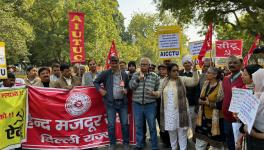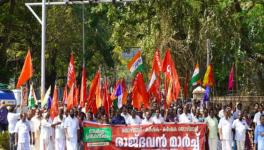Strike at Auto Parts Factory Highlights Growing Union- Management Rift in Manesar
Napino's permanent workers have been staying put inside the factory premises in protest since July 14. Image courtesy - Special Arrangement
New Delhi: The strike at Napino Auto & Electronics Limited, located in Haryana’s Manesar, over the revision of wages has brought to the fore the growing rift between the management and trade unions in the country’s leading auto hub.
Emboldened by the passage of the four labour codes, which the Centre has promised to roll out soon, and the “anti-worker” policy post-pandemic, factory owners have taken a “harsher stand” on worker demands, trade unions allege.
Employer representatives, on the other hand, cite a “financial crunch” and suggest that the tension in the industrial belt is the result of the Centre’s lack of support for industries.
Monday marked the 12th day of strike at Napino, which supplies automotive electronic components to leading auto companies, including Hero and Maruti Suzuki, among others.
Demanding a three-yearly wage settlement agreement due since 2019, around 270 permanent workers, including women, have been staying put inside the factory premises in protest since July 14. The union has demanded an increase in the wage of a permanent worker from Rs 23,500 to Rs 28,000. The workers claim that multiple rounds of talks between the management and union have only ended in a stalemate.
“We have been pressing the management to sign a long-term settlement with the union for many years now but to no avail. Annual increments have been awarded to those within the management but salaries of workers have remained the same since 2019,” Parshuram, general secretary of the union, told Newsclick over the phone.
Explaining how the workers were “left with no choice but to go on strike” with the surge in prices of essential commodities in the last few years and in recent months, Parshuram said, “When it is becoming difficult to fulfil the needs of our families, how are we expected to continue?”
A Napino official, however, told Newsclick that the management has been “fair and firm” in its stand when it comes to wage settlement of its permanent workforce. “We explained it to the union multiple times that its wage demands will put an additional burden on the company’s balance sheet, which is unaffordable,” he said adding that the company is “still reeling under the pandemic-induced financial challenges”.
Claiming that the matter was referred to the Punjab and Haryana High Court by Haryana’s labour commissioner following the tripartite meeting held in Chandigarh on July 13, the company official said that the strike is “illegal.”
The management and the union were scheduled to meet in the presence of Manesar’s deputy labour commissioner on Monday. “In case, the strike is not called off and the occupation of the factory premises is not ended amicably, the management will be forced to take stern action against those responsible,” the company official said.
The Napino case is among the many such instances in Manesar, Shyam, of Automobile Industry Contract Workers Union, told Newsclick. “Similar discontent” at Munjal Showa Limited and Bellsonica Auto Components Private Limited, among others, could “lead to a protest or strike”, he said.
“Factories in Manesar are increasingly taking a harsher stand on union demands ever since the labour codes were passed in Parliament,” Shyam added.
Flayed by trade unions for diluting worker rights, the three labour codes—Industrial Relations Code, Code on Social Security and Occupational Safety and Health and Working Conditions Code—were passed in Parliament in September 2020 without a proper debate. The other code, Code on Wages, was passed in 2019. These codes are set to replace and subsume 29 Central labour enactments.
Shyam underscored his argument by giving the example of Manesar-situated JNS Instruments Limited, where striking workers were arrested in March after violence broke out near its manufacturing facility during a two-day general strike called by the Central Trade Unions. The workers were pressing for a union in the factory and the regularisation of its contractual employees.
Satbir Singh, of the Centre of Indian Trade Unions (CITU), agreed with Shyam that talks with the management of factories are increasingly becoming difficult, especially after the pandemic. “The management in many factories continues to pass financial losses on to the workers; others are looking to replace their permanent workforce with temporary ones,” he said.
Asked about the union’s allegations, Rajesh Gupta, vice-president, Manesar Industries Welfare Association, agreed that “tensions between the management and unions are rising”. “After being hit by a slowdown and then by the pandemic, the auto industry is not in a healthy shape. Many companies are facing a financial crunch. The recent spike in the cost of raw materials due to the adverse global situation has only made it further difficult for many factories to sustain,” he argued.
Gupta blamed the Centre for “not providing enough support to the industries to cushion the blow and asked for “active intervention”.
The Trade Union Council, a group of major unions in Manesar, has decided to take up the matter with Gurugram’s deputy labour commissioner at a meeting on Wednesday, Singh told Newsclick. “We are ready to stage a joint protest in the industrial town if the concerns of workers are not addressed,” he said.
Get the latest reports & analysis with people's perspective on Protests, movements & deep analytical videos, discussions of the current affairs in your Telegram app. Subscribe to NewsClick's Telegram channel & get Real-Time updates on stories, as they get published on our website.
























